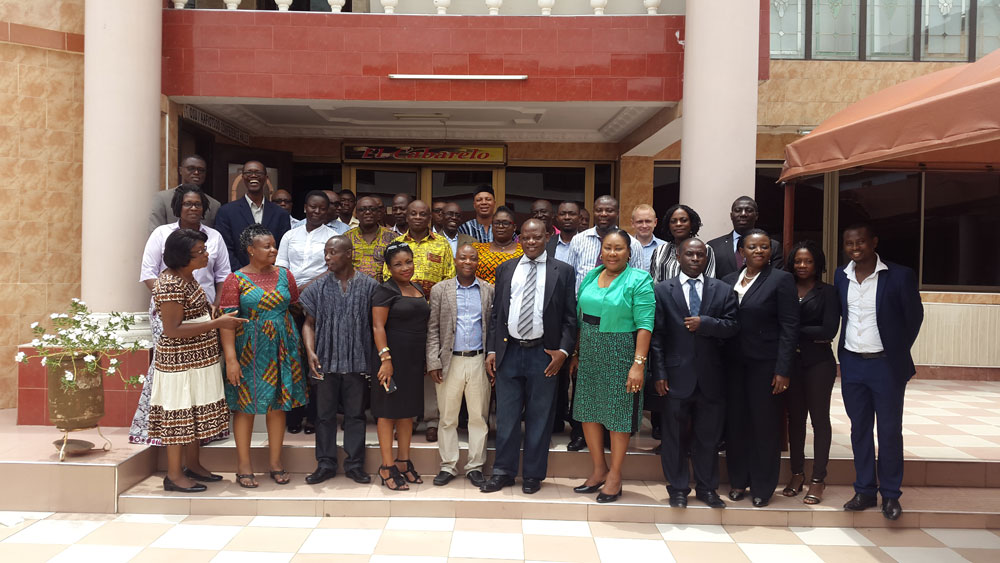
Panama Papers Give Further Impetus for Beneficial Ownership Disclosure in Ghana
In advance of Ghana’s 2016 election, political parties have started making public commitments to the disclosure of beneficial owners of companies. The president of Ghana’s announcements at next month’s U.K. Anti-Corruption Summit are therefore highly anticipated.
An important meeting to launch concrete plans to tackle beneficial ownership disclosure was convened in the sylvan town of Dodowa, outside Accra, last week.
The revelations from the Panama Papers provided a timely and important backdrop for this meeting of politicians, company executives, government officials and civil society representatives discussing a seemingly simple question: how can the public know the individuals who ultimately control or profit from companies in the extractive sector in Ghana?
Without clear disclosure requirements, webs of extractive company ownership, sometimes stretching across the world from one secretive jurisdiction to another, can often make identifying the beneficial owner of a company a difficult task.

Participants at the Ghana beneficial ownership meeting in Dodowa
The recent leaks have provided further insight into these complex and opaque ownership structures, which can present high corruption and tax avoidance risks. With the veil partially lifted by the Panama Papers, we have been reminded of how some prominent, politically affiliated individuals can sometimes be found at the center of such arrangements.
Such risks have spurred a growing global trend toward transparency around beneficial owners, especially in the extractives. While the problem is not limited to the extractive sector, the risks are particularly high in oil and mining.
The Panama leaks exposed the use of offshore financial structures by those associated with prominent Ghanaians, including family members of former President John Kufuor and former U.N. Secretary-General Kofi Annan. There is currently no alleged illegality. However, many groups in Ghana have long been aware of the risks associated with these arrangements. In the absence of transparency, these arrangements present questions about conflict of interest, corruption and tax avoidance.
The push for beneficial ownership disclosure has been gaining momentum in Ghana partly owing to concerns exacerbated by a lack of transparency in petroleum agreements and rumors about the role of politicians in illegal mining. In recent years, civil society in Ghana has objected to some of the petroleum agreements ratified by parliament. AGM Ghana, which won the right in 2013 to explore part of Ghana’s South Deep Water Tano Block, continues to be a source of concern. AGM Ghana is owned by little-known Gibraltar-based company, AGM Petroleum, which is itself owned by three further companies and is a related to a range of others. It is understandable why the Africa Centre for Energy Policy raised concerns about the need for transparency around the individuals who ultimately control or profit from these contracts.
So long as ownership is left opaque, Ghanaians will always be left with doubt: is a beneficial owner of this company in a position to influence the bidding and issuing of the company’s contract? Are they involved in the shaping of laws governing the contract? How can tax authorities check whether AGM Ghana has entered into a contract with a related party (and identify a risk of tax avoidance)? The disclosure of beneficial ownership information could help answer some of these questions and allay underlying public concerns.
For the government of Ghana, beneficial ownership disclosure is not just about the extractive sector, but also about how these issues link to broader concerns. Disclosure also reflects growing international obligations. “Beneficial ownership disclosure will make it difficult for criminals trying to circumvent anti-money laundering and counterterrorist financing measures,” said Kwabena Oku Afari, the director of the finance ministry’s real sector division, in his opening address in Dodowa.
The Dodowa meeting was an opportunity to start legislative and administrative planning for the public disclosure of beneficial ownership information. The Ghana Extractive Industry Transparency Initiative (GHEITI) and the Ministry of Finance convened the meeting, supported by NRGI and Ghana Open Government Partnership. And GHEITI has proven once again to be a vitally important platform to drive policy reforms and collaboration amongst government institutions.
“The Panama Papers are very timely, as the push in Ghana to create transparency around beneficial ownership is gaining momentum, “said Dr. Steve Manteaw, co-chair of GHEITI, at the meeting. “This gives us a lot to take forward.”
Following the discussions last week, a cabinet memo will be submitted to the president’s office with clear recommendations. This is likely to require legislative changes to the long overdue Exploration and Production Bill and Companies Bill, which are currently before parliament.
The aspiration emerging from the meeting last week is to create an obligation on reporting and publishing beneficial ownership information, made publicly available in a register maintained by the Register General’s department. It will also become part of regular reporting by GHEITI. The goal is also for Ghana’s beneficial ownership disclosures to be made in an open data format that facilitates linkages with other information platforms domestically, as well as internationally, for example with the proposed global beneficial ownership register.
Any potential conflicts of interest will need to be identified and reported, and will likely be assessed by Ghana’s Commission on Human Rights and Administrative Justice. GHEITI and its partners will explore this in more detail in coming weeks.
“By maintaining a beneficial ownership register for all sectors in Ghana, it will provide the opportunity to reduce corruption and patronage in public procurement and contracting,” said our colleague Emmanuel Kuyole, NRGI’s Africa deputy director. “Now it is important to for the government and GHEITI to take lead on this.”
The leaks from the Panama Papers will continue to create headlines, but the real opportunity is in how these headlines can be translated into policy reform that enables citizens and governments to lift the veil on problematic forms of secret corporate ownership that create risks of corruption and tax avoidance.
In Ghana, inroads are being made, but GHEITI and the government must maintain pace to ensure that this opportunity is not missed.
Mark Evans is NRGI’s Africa economic analyst and Samuel Bekoe is NRGI’s Africa associate.
Authors

Mark Evans
Africa Economic Analyst
